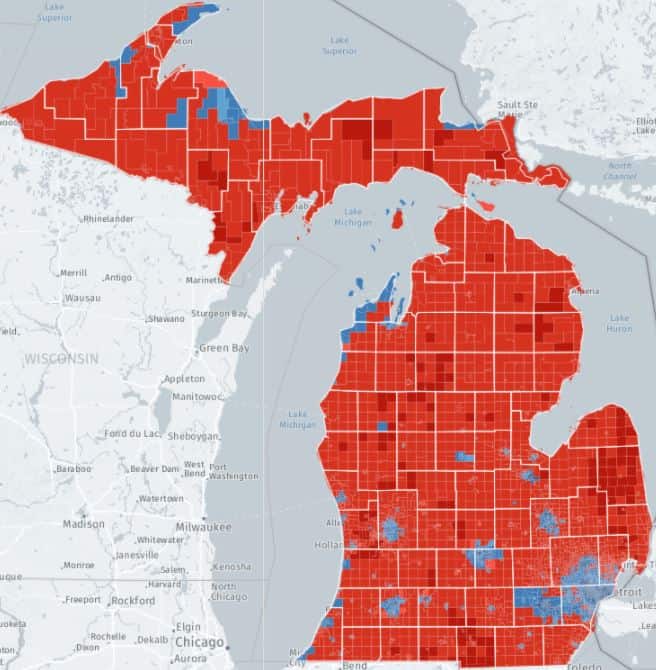LANSING – Voters would be required to show a photo identification card while voting or within 10 days after the election at a local clerk’s office to have their voted counted under legislation being considered in the Michigan House Elections Committee.
The bills (HB 6066, HB 6067 and HB 6068) were introduced by Elections Committee Chair Rep. Lisa Posthumus Lyons (R-Alto), who said it should be “easy to vote, but not easy to cheat.”
Under the legislation a person would be required to show photo ID to vote, and if they did not have an ID with them at the time of voting, they would vote with a provisional ballot. That ballot would not be counted until the person went to the local clerk’s office within 10 days after the election and showed ID.
The committee did not vote on the bills Wednesday, but is scheduled to take up the legislation again on Thursday and could report the bills to the House floor.
Democrats, the American Civil Liberties Union of Michigan and voting rights advocates opposed the bill.
Clerks also raised concerns with the bills. East Lansing City Clerk Marie Wicks said an unintended consequence of the bills could be putting additional burdens on seniors or others on Election Day.
“I have a polling location at a retirement home and we had 46 people who had to use affidavit before they voted because they forgot their ID,” she said. “It would be burdensome to make them come to the clerk’s office. I do think this is potentially burdensome on folks we don’t want to burden.”
Kent County Clerk Mary Hollinrake said the bills would substantially increase the use of provisional ballots. She said in Kent County there were easily 1,000 voters who signed the affidavit of identity and would have to vote on a provisional ballot under the bills.
The bills would also make it easier for a person to get their live birth record, exempt indigent people who cannot pay for an ID and exempt those who religiously object to being photographed.
Lyons said she wants to make sure the state is protecting the integrity of the elections and also not setting up barriers. When asked if she thought people were “cheating” the system, she said she did not know.
“What I do know is there are anywhere between 10,000 and 20,000 people who voted without showing an ID and signed that affidavit and we don’t know if they are who they say they are,” she told reporters after the committee. “And as we have experienced in several elections here in Michigan, every vote counts.”
Under current law, voters declining to show identification sign an affidavit attesting to their identity and vote a regular ballot.
Lyons said the bills are based on Indiana’s law, which has survived a legal challenge.
The bills would not affect absentee voting, and seniors and others who qualify could still request a ballot by mail and receive it without showing identification.
Rep. Klint Kesto (R-Commerce Township) asked the clerks what would happen if a person signed the affidavit falsely and then the real person came in to vote. Wicks said the first vote would be tabulated, but the second one would be held provisionally while an investigation occurred.
However, she said that has only happened once, and it was because two people had the same name.
Rep. Jeff Irwin (D-Ann Arbor) questioned what citizens born in a foreign country would do if they could not get a birth certificate.
Lyons said there are other ways to prove identity and immigrants in the country legally should have access to other documents.
Merissa Kovach, policy strategist with the ACLU, said the bills would make it more difficult for the elderly, disabled and minorities to vote. She said it would disenfranchise those who do not have an ID.
“Voting is a fundamental right. I think some people fail to see the harm in voting IDs because we are so used to using our IDs,” she said. “When we purchase alcohol, when we board a plane, but those are rules set up for purchasing goods and services, not the practice of constitutional rights.”
Lyons told reporters her bills seeking to make the elections more secure is unrelated to the recount for the presidential election being requested and Republicans calling it frivolous with no proof of fraud.
“I think this is completely unrelated to the recount. … I think candidates should have the right to ask for a recount,” she said. “I think they should also have the responsibility to pay for that. Especially if the election results, as they have acknowledged, change the results … for Jill Stein.”
Lyons said she would like to consider legislation increasing the cost for recounts, particularly for statewide races, so what the candidate pays matches what it costs the state.
This story was published by Gongwer News Service. To subscribe, click on www.gongwer.com







